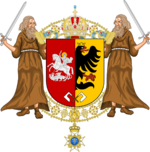Royal and Imperial Army (Urcea): Difference between revisions
m (→Uniform) |
m (→History) |
||
| Line 50: | Line 50: | ||
The Royal and Imperial Army has seen action in major wars between the world's great powers, most especially including the [[Second Great War]]. The strength of the armies in the [[Caroline Wars]] allowed [[Urcea]] to become the preminant military and geopolitical power in [[Levantia]]. Since the end of the [[Occidental Cold War]] and beginning of [[The Deluge]], the Army has primarily been involved in both offensive and peacekeeping operations throughout northern [[Crona]] and [[Cusinaut]]. | The Royal and Imperial Army has seen action in major wars between the world's great powers, most especially including the [[Second Great War]]. The strength of the armies in the [[Caroline Wars]] allowed [[Urcea]] to become the preminant military and geopolitical power in [[Levantia]]. Since the end of the [[Occidental Cold War]] and beginning of [[The Deluge]], the Army has primarily been involved in both offensive and peacekeeping operations throughout northern [[Crona]] and [[Cusinaut]]. | ||
==Name== | |||
==History== | ==History== | ||
Revision as of 12:38, 22 September 2022
This article is a work-in-progress because it is incomplete and pending further input from an author. Note: The contents of this article are not considered canonical and may be inaccurate. Please comment on this article's talk page to share your input, comments and questions. |
| Royal and Imperial Army | |
|---|---|
 Emblem of the Royal and Imperial Army | |
| Founded | 1591 |
| Country | |
| Type | Army |
| Role | Land warfare |
| Size | 4,071,512 regular personnel 4,490,798 reservists |
| Part of | Armed Forces of the Apostolic Kingdom of Urcea |
| Patron | Riordan VIII |
| Commanders | |
| Magister Militum | Livio Iarnán |
The Royal and Imperial Army is the principal land warfare force of Urcea, a part of Armed Forces of the Apostolic Kingdom of Urcea. In the 2010s, the Royal and Imperial Army was comprised of just over four million active personnel with a similar number of enrolled reservists.
The modern Army traces its history back to 1591 upon establishment of a standing army by King Leo II. The term Royal and Imperial Army was used whenever the Apostolic King of Urcea also held the title Emperor of the Levantines, and has been the permanent name of the force since 1935 with the Treaty of Corcra. Members of the Royal and Imperial Army swear allegiance to the monarch as their commander-in-chief, though precedents established during the Aedanicad and before invest most authority with the Procurator, who holds the title of Magister Militum. The army is administered by the Ministry for the Armed Services and commanded by the Deputy Lord Marshal for the Army.
The Royal and Imperial Army has seen action in major wars between the world's great powers, most especially including the Second Great War. The strength of the armies in the Caroline Wars allowed Urcea to become the preminant military and geopolitical power in Levantia. Since the end of the Occidental Cold War and beginning of The Deluge, the Army has primarily been involved in both offensive and peacekeeping operations throughout northern Crona and Cusinaut.